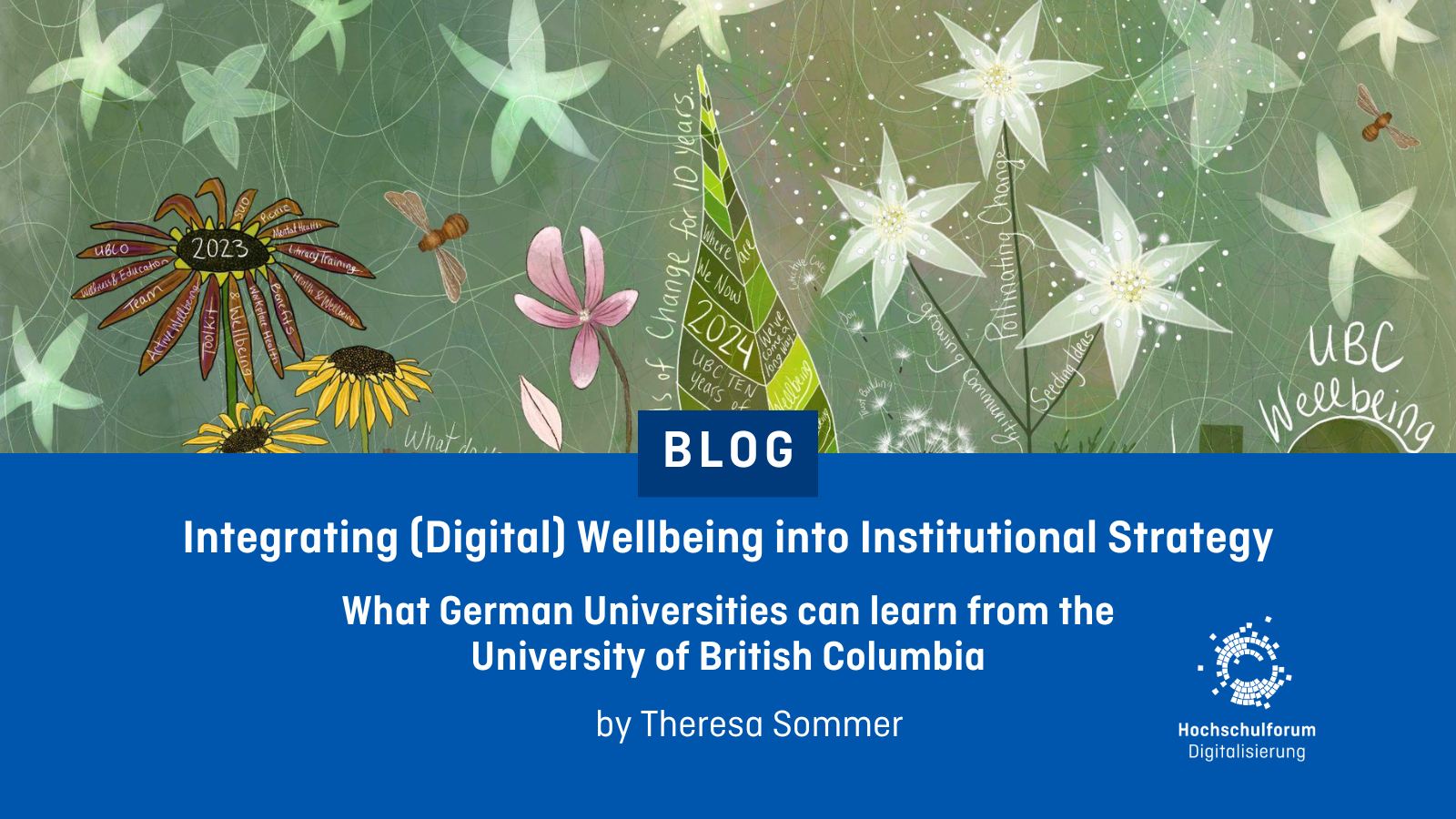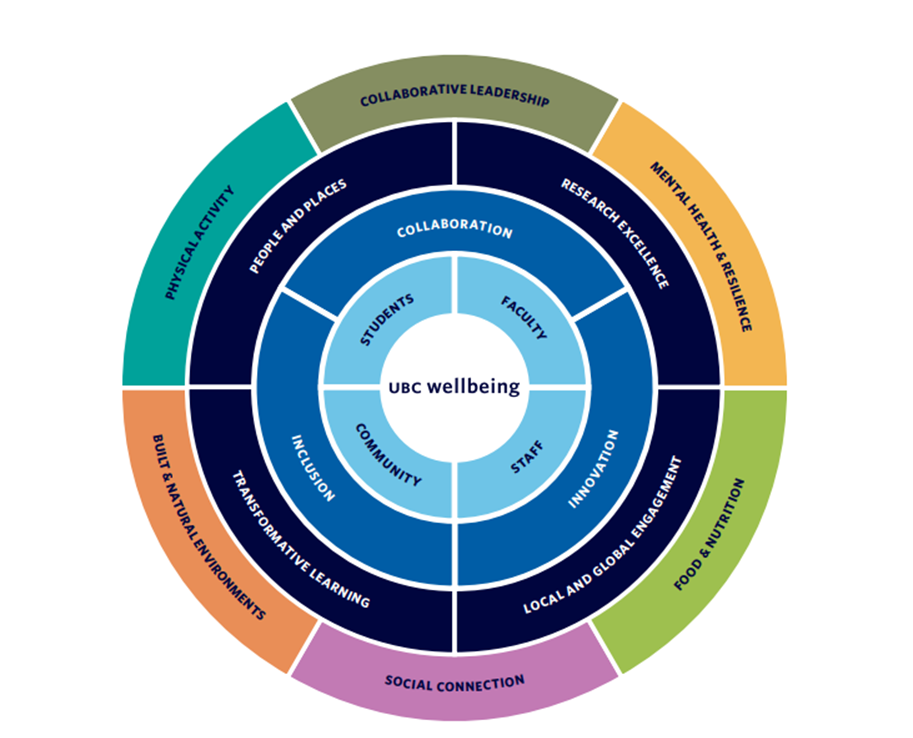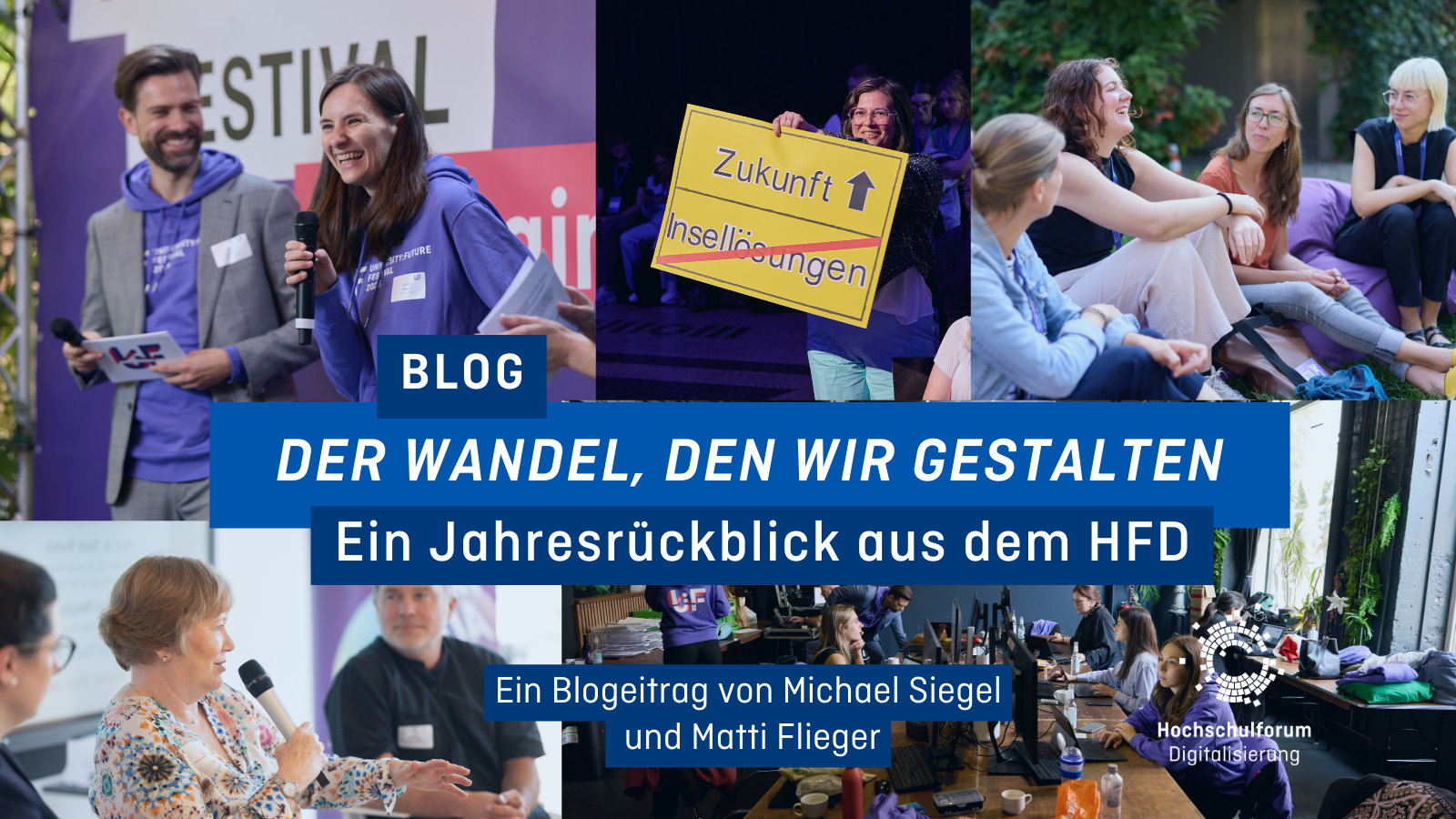Integrating (Digital) Wellbeing into Institutional Strategy: What German Universities can learn from the University of British Columbia
Integrating (Digital) Wellbeing into Institutional Strategy: What German Universities can learn from the University of British Columbia
05.05.25
Promoting wellbeing at universities is no longer a peripheral issue: it forms the foundation for successful (digital) teaching and learning environments and is increasingly being strategically embedded on an international level. Universities like the University of British Columbia (UBC) in Canada recognized this early on and integrated wellbeing deeply into their institutional strategy. For this blog article, Mandy MacRae, Wellbeing Engagement Strategist at UBC, provides insights into the history and significance of the wellbeing initiative and explains how challenges and successes have shaped UBC’s journey toward becoming a health-promoting university.
Digital technologies have become an integral part of everyday university life, influencing how knowledge is conveyed, organized, and consumed. Virtual learning platforms and hybrid formats create flexibility, facilitate collaboration across locations, and open up new forms of interaction. At the same time, they also bring challenges, such as constant use of digital tools, the feeling of not being able to “switch off,” or the lack of spontaneous social interactions. Universities face the task of using digital technologies in ways that enable productive work and learning without compromising the wellbeing of their university members.
For the Think Tank Well-Being and Mental Health in the Digital Age at Universities, Tina Basner, Lea Hildermeier and I, developed a discussion paper formulating six recommendations for strategic decision-makers at German universities. During our research, we came across the University of British Columbia (UBC)—a Canadian university that demonstrates how targeted wellbeing strategies can support both the individual needs of students, faculty, and staff as well as sustainable institutional development.

Diskussionspapier Nr. 36: Wellbeing & Mental Health im digitalen Zeitalter: Warum Hochschulen jetzt handeln müssen
In an interview with Mandy MacRae, Wellbeing Engagement Strategist at the Office of Wellbeing Strategy at the University of British Columbia, we gained exciting insights into the beginnings and development of the university’s wellbeing approach. The Office of Wellbeing Strategy serves as a strategic backbone to advance UBC’s Wellbeing Strategic Framework, providing alignment, coordination, facilitation and evaluation support to the network of teams leading wellbeing action under UBC Wellbeing. While UBC Wellbeing recently celebrated its ten-year anniversary in 2024, its foundation was built through the collective efforts of individuals and teams across the university over many years.
Since opening Student Health Services in 1929, UBC has championed wellbeing through both services and strategic initiatives. Over the decades, the university expanded its focus beyond clinical care, recognizing the need for a holistic, systems-wide approach. In the 1990s, the UBC Health Promotion Program was created, and in the 2000s, UBC strengthened its commitment to workplace wellbeing by establishing a dedicated human resources team to support employee wellbeing. This momentum, along with other key milestones, led to the launch of UBC Wellbeing in 2014 – a collaborative, whole-university effort to embed health and wellbeing into all aspects of university culture and life. From a global perspective, wellbeing is clearly more than just a buzzword.
A defining moment came in 2015 when UBC Okanagan hosted the International Health Promoting Universities Conference, which led to the development of the Okanagan Charter: An International Charter for Health Promoting Universities & Colleges. This Charter, developed by educational and health representatives from 45 countries, promotes health and wellbeing as central elements at post secondary institutions worldwide. It defines health broadly, going far beyond the mere absence of illness. Physical, mental, and social wellbeing are considered essential prerequisites for a functional learning and working environment. The goal is to transform universities into places where all students, faculty, and staff are holistically supported.
The Okanagan Charter calls on universities worldwide to see wellbeing not as a “nice-to-have” but as a core principle of their strategy. It’s about creating an environment where students, faculty, and staff are physically, mentally, and socially supported—an approach that should no longer be an additional offering but firmly rooted in the “DNA” of the university’s culture. With the adoption of the Charter in 2016, UBC took a decisive step towards embedding wellbeing as a strategic value at all levels. These commitments were outlined in UBC’s Wellbeing Strategic Framework and later reinforced in UBC’s Strategic Plan: Shaping UBC’s Next Century.
Today, student, faculty, and staff teams across the university have made significant strides in embedding wellbeing across UBC. UBC Wellbeing is not the effort of a single unit or department, but a collective initiative, with everyone contributing to making the university a better place to live, work, learn and play. The strategy relies on a strong network of partners, including an executive leadership team, advisory committee, strategic support team, and various committees and communities of practice from diverse areas such as arts and culture, urban planning, sustainability, and health. This collaboration brings together expertise from various disciplines to explore diverse perspectives and ideas to sustainably promote a campus culture of wellbeing.
The Wellbeing Approach at UBC: A Holistic Concept
With its Wellbeing Strategic Framework, the University of British Columbia pursues a holistic approach, understanding health and wellbeing as integral to university culture. The goal: to create conditions where students, faculty, staff, and the entire community can learn, work, and live in a healthy, supportive environment—both physically and digitally. Informed by research and developed in consultation with the UBC community, the framework encompasses six key action areas covering all aspects of campus life: mental health and resilience, food and nutrition, social connection, built and natural environments, physical activity, and collaborative leadership. Each area is aimed at promoting the wellbeing of the entire university community and is supported by measurable goals and evaluations to track progress and identify areas for action.

A particular focus is on promoting mental health, especially through “mental health literacy,” the knowledge and understanding to assess and support one’s own mental health and that of others. In early 2023, UBC introduced Mental Health Literacy Training for leaders. A total of 2,011 faculty and staff with managerial duties participated in the 45-minute digital training during 2023/24—a strong indication of how important it is to raise awareness among university employees about wellbeing topics and provide targeted digital resources. A central element of UBC’s wellbeing approach is the use of evidence-based data to make targeted and informed decisions. Internal surveys and external data sources, such as the Canada-wide Campus Wellbeing Survey (CCWS), offer valuable insights into the university community’s wellbeing. Thie data provides a basis for measurable progress and helps identify new needs. In Germany, comparable projects like the “Bielefelder Fragebogen” (“Bielefeld questionnaire”) provide important health data, which should also be increasingly utilized strategically to support sustainable decisions.
Lessons in Wellbeing: From a Simple Idea to Campus Culture
The University of British Columbia’s wellbeing approach impressively demonstrates how an initial idea can evolve into a comprehensive campus culture of wellbeing. A crucial part of this success lies in small, targeted steps involving all levels of the university. By continuously addressing the needs of its community and making the concept of wellbeing tangible, UBC has managed to gain broad participation and support—or “buy-in”—at all levels. This strategy motivates students, faculty, and staff to actively engage and become wellbeing ambassadors themselves.
Digital tools play a central role in promoting wellbeing on campus and proactively addressing technostress – that is, the stress caused by the use of digital technologies. UBC offers programs like the self-directed online learning courses on Canvas for students, virtual training on the Workplace Learning Ecosystem for employees, and peer-to-peer offerings to meet the needs of its university community. These digital resources are much more than emergency solutions—they provide long-term support that contribute to a culture of wellbeing.
An essential pillar of success is the role of “Wellbeing Champions”: dedicated individuals who actively promote the topic of wellbeing across campus. Whether in leadership roles or as engaged network members, these champions provide valuable momentum, help build connections, and spread the message. MacRae also emphasizes that support from university leadership was crucial from the outset to embed wellbeing into UBC’s culture.
In conclusion, UBC’s approach to wellbeing can perhaps best be described as follows: It is not the plans and a comprehensive vision alone but the practical implementation, collaboration, and commitment of teams across the university community that make the difference. Small steps—seemingly inconspicuous but steadily embedded—have created a culture of wellbeing that permeates all levels of campus life and shapes community interactions. Or, as Mandy MacRae aptly put it in the interview: “Plant the seed and see what happens!”
Author

Theresa Sommer has been Project Manager for the Hochschulforum Digitalisierung at the CHE Centrum für Hochschulentwicklung since 2024. Here, she is particularly involved in the topics of health promotion, wellbeing and digital sustainability at universities. Before joining the HFD, Theresa Sommer worked as a research assistant at Bielefeld University and Clausthal University of Technology. There she focussed in particular on political communication, policy field analysis and the role of science in political processes, especially in times of crisis and in international environmental policy. Prior to this, she studied sociology at Bielefeld University.


 Michael Siegel
Michael Siegel 
 Andreas Giesbert
Andreas Giesbert 
 Uwe Reckzeh-Stein
Uwe Reckzeh-Stein 